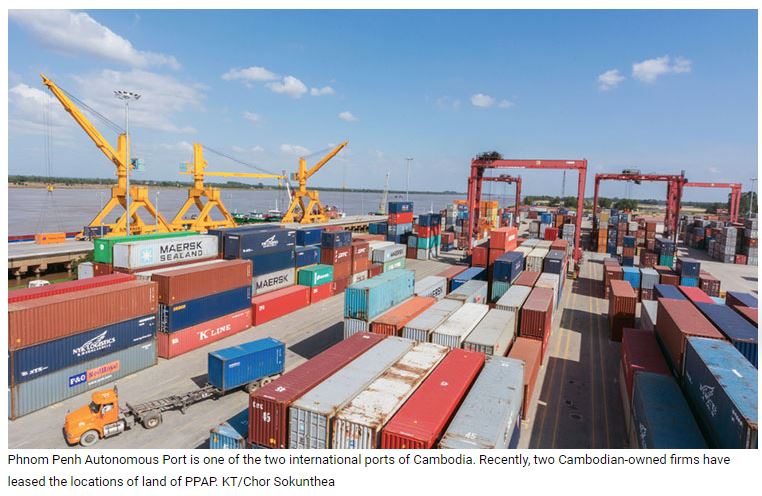Cambodia: Local firms succeed Hui Bang in leasing land of PP Port
Two Cambodian-owned firms have leased two locations of land of Phnom Penh Autonomous Port (PPAP) after Hui Bang International Investment Group Co Ltd on Thursday last week terminated leasing land of about 50 percent of the total land area of 40,000 square metres of the port, according to an official of PPAP.
One of the local companies has succeeded Hui Bang International in leasing Sihanoukville-located about two hectares of PPAP after the latter terminated the leasing contract that it signed with the port to lease the land for forty years commencing from 15 March 2019, which the lease transaction had been incurred for about four years and a half, according to the official.
The official who declined to be named told Khmer Times yesterday that another local firm has reached an agreement with the PPAP to lease nearly 1-hectare land on a premise of another state-owned firm Green Trade Company under the technical supervision of the Ministry of Commerce and under the financial supervision of the Ministry of Economic and Finance.
“We have not received any update information regarding the objective of the development on the leased land from those companies yet and we also did not know what the Chinese firm, who had leased the land, wanted to do on the land,” he said, adding that the nearly 1 hectare of leased land is located in Russei Keo district of Phnom Penh, while nearly 2 hectares of leased land is in Sihanoukville. “We also do not know when they will start the development work yet.”
Hui Bang International terminated the leasing land of 18,836.69 squares metres of PPAP last week after it signed a land leasing contract with the port for 40 years commencing from 15 March 2019, but the company has requested for the termination due to internal financial problem, according to the release by Cambodia Securities Exchange (CSX).
“The company faced a financial crisis for which it was to unable to pay the leasing fee [and the port] has agreed and informed the company about the above request,” the release pointed out, adding that the amount of transaction suspended or terminated is about $7.16 million and the sales in the latest fiscal year are about $30.78 million.
Kim Sophanita, director of CSX’s market operations department, told Khmer Times yesterday that the succeeding deals would benefit PPAP, which means it would most likely not affect the negative fluctuation of the price PPAP, which is also the stock symbol of the port even though the current revenue for this year is achieved by just about 23.26 percent of the total revenue in the previous year—ratio to sales.
The 23.26 percent the ratio to sales is very big and it reflects that PPAP would be most likely facing a big loss of revenue, which leads to a loss of profit that could fall into the negative area, Sophanita pointed out, adding that ultimately the dividends that investors expect to gain next year will be negatively affected if the port is unable to make new deals.
“I think the suspension of the lease would affect the stock’s price if the company cannot find new customers from now to the end of the year because the former customer that had faced financial crisis contributed the big percentage of the total revenue of the port compared to last year,” Sophanita added.
PPAP is one of the two international ports of Cambodia that have received the Japan-financed Port Electronic Data Interchange (Port EDI) system that was made a soft launch in mid-August at the Ministry of Public Works and Transport (MPWT) to put an end to paper-based procedures for private sector’s vessels entrance into and exit.
“When vessels arrive, the goods can be loaded down and then they can leave immediately without waiting like for stamping and officials just click ‘ok’ along with digital signature and QR Code and the payment is made online without going to banks. So, this is the new achievement of the government where it is no longer needed to use paper,” Chanthol added.
There are about 6,000 foreign vessels entering and leaving sea and river ports annually in Cambodia, according to the figures of MPWT, adding that those vessels are required to go through manual and paper-based ship clearance formality procedures to enter and leave Cambodia, which was inefficient, time-consuming and port congestion.
Source: https://www.khmertimeskh.com/501149494/local-firms-succeed-hui-bang-in-leasing-land-of-pp-port/


 English
English




